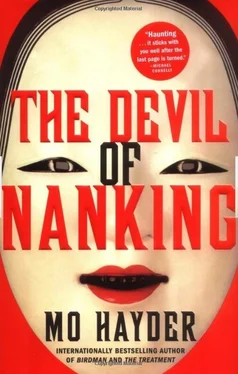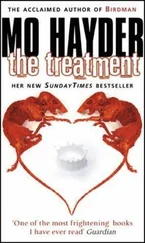I put down the cup and looked at him, my head on one side. He’d never talked about Nanking like this.
‘Yes,’ he said, running his fingers round the rim of his cup. ‘It used to worry me. There wasn’t enough land in Nanking for marked graves. Most people waited months to be buried. Some had already disappeared into the earth or into… into one another, before there was a chance to…’ He hesitated, looking into his tea, and suddenly he seemed very old. I could see the blue veins under his loose skin. I could sense his bones, waiting under the surface. ‘I saw a small child once,’ he said, in a quiet voice. ‘She’d had some – some flesh removed by the Japanese, here, under her ribs. Everyone thought she was dead, but no one had buried her. She lay there for days, in full view of the houses, but no one came out to bury her. I still don’t understand why they didn’t. In Nanking it was the lucky ones who were left with a body to bury…’ He trailed off into silence, watching his fingers moving round the cup.
When it seemed that he wasn’t going to speak again, I sat forward and lowered my voice to a whisper: ‘Shi Chongming. Tell me what happens on the film.’
He shook his head.
‘Please.’
‘No.’
‘I need to know, I need to know so much.’
‘I’m sorry. If you need to know so much you’ll help me with my research.’ He looked up at me. ‘That is why you’re here, isn’t it?’
I sighed and sat back in the chair. ‘Yes,’ I said. ‘Yes, it is.’
He smiled sadly. ‘I thought I had lost you. For a long time I thought you had drifted.’ He gave me a look then that was sad and sweet and quite unlike any look he had ever given me before. For the first time since we’d met I had the feeling he liked me. I supposed I’ll never know what journey he’d been on during those few weeks when we didn’t speak. ‘What made you come back?’
When I got up to go I should have just opened the door and left. But I couldn’t help myself. I stopped at the door and turned back to where he sat at the desk. ‘Shi Chongming?’ I said.
‘Hmmm?’ He looked up, as if I’d interrupted his thoughts. ‘Yes.’
‘You told me that ignorance and evil are not the same thing. Do you remember?’
‘Yes. I remember.’
‘Is it true? Do you think it’s true? That ignorance isn’t evil?’
‘Of course,’ he said. ‘Of course it’s true.’
‘You really mean it?’
‘Of course I mean it. Ignorance you can forgive. Ignorance is never the same as evil. Why do you ask?’
‘Because… because…’ A feeling was racing through me, coming from nowhere, making me feel strangely powerful and lightheaded. ‘Because it’s one of the most important questions in the world.’
As the day went on it was getting colder. There was a threat of rain in the air and in the lines of traffic waiting at the lights car windows were closed tight, steamed up. The wind skulked round corners, out of sight, then leaped, picking things up and racing off into subway entrances with its prize. I got off the train a few blocks away from Fuyuki’s apartment complex, tightened my coat and walked quickly, using the red and white Tokyo Tower as a guide, going through streets I didn’t recognize, full of small restaurants and noodle-makers. I passed a wholesaler’s called Meat Rush, and slowed, staring rudely at the customers in the basement car park loading up their huge cars with twenty-pound joints. Meat. Japan and China had shared years when the only protein people could get was silkworm cocoons, grasshoppers, snakes, frogs, rats. Now they had places called Meat Rush.
Meat, I thought, stopping at the iron railings outside Fuyuki’s apartment. Meat. One of the garages was open and a man in overalls was waxing one of Fuyuki’s big black cars. The windows were open, the keys were in the ignition, and the radio was playing a song that sounded to my ears like the Beatles. A gardener was using a hose to clean the path. I laced my hands round the railings and looked up the outside of the building to the penthouse. The windows were mirrored, black. They showed nothing, only the reflection of the cold sky. Shi Chongming thought that whatever Fuyuki had in his apartment needed to be preserved. Especially if it was dangerous or difficult to replace his supply…
There was a phone box just opposite the apartment building so I went to it and got inside, where all the photos of Japanese girls in their knickers were wedged into the creases behind the coin box. I fumbled in my wallet, took out Fuyuki’s meishi and stared at it. Winter Tree. Winter Tree. I pushed my hair off my face and dialled the number. I waited, biting my nails. Then there was a click and a mechanical woman’s voice said in Japanese: ‘Sorry, but this number is unobtainable. Please check and redial.’
Over in the apartment buildings the gardener was coiling up the hose. The water ran off into the flower-beds, where the ornamental cabbages had been wrapped with string to keep their shape over the winter. I hung up the receiver, pushed the meishi into the bag and turned for home. Tonight was the night Mama Strawberry got her drinks delivered. She was usually in a good mood. Tonight I was going to ask her again what she had meant when she told me not to eat at Fuyuki’s.
When I saw Jason again, at the club that evening, it was almost as if nothing had happened. I was checking my makeup at the mirror in the little cloakroom when he stopped on his way to the bar and said, ‘I know what you need. I know how to make you feel better.’ He pointed at my stomach and winked slyly. ‘You just need to work off a little frustration, that’s all. We’ll figure it out when we get home.’ When he’d gone, and I was sitting on my own again, looking at my face in the mirror, I was surprised to find that I felt nothing. Nothing at all. There’s something scary about how quickly I can draw back into myself. It’s practice, I suppose.
It was an odd night. I didn’t say much to the customers, and some of the other hostesses asked me if I was feeling well. From time to time, in a lull in the conversation, I’d find Jason staring confidently at me from where he stood in front of the bar. Once he raised his eyebrows and mouthed something I couldn’t understand. I didn’t respond.
Mama Strawberry had been drinking tequila for a long time. I’d been watching her out of the corner of my eye, seeing her light cigarettes then forget and leave them smouldering in ashtrays. She kept sitting on customers’ knees, and swayed when she walked. When there was a break between customers I went to the desk and sat down opposite her. ‘Strawberry,’ I said. ‘I still need to know. I need to know what stories you heard about Fuyuki.’
‘Scccht!’ she hissed, flashing a dangerous look at me, her blue contacts catching light from the skyscrapers outside and refracting it back like diamonds. ‘You forget everything Strawberry say. Okay. Everything.’
‘I can’t forget. Why did you tell me not to eat anything?’
She swallowed more tequila and clumsily fitted a cigarette into her holder, making three or four stabs at it before she succeeded. She lit it, and searched my face with her watery eyes. ‘Listen,’ she said, after a while, in a different, softer voice. ‘I’m gonna tell you something. I’m gonna tell you about Strawberry mother.’
‘I don’t want to hear about your-’
‘Strawberry mother,’ she said steadily. ‘Very interesting woman. When she a girl, little girl like this big, everyone in Tokyo got no food.’ I opened my mouth to interrupt but Mama Strawberry’s hand lifted to stall me. Her voice was intense, focused, her eyes pinned on a point above my head. ‘You know that, Grey? Everyone hungry.’
Читать дальше












